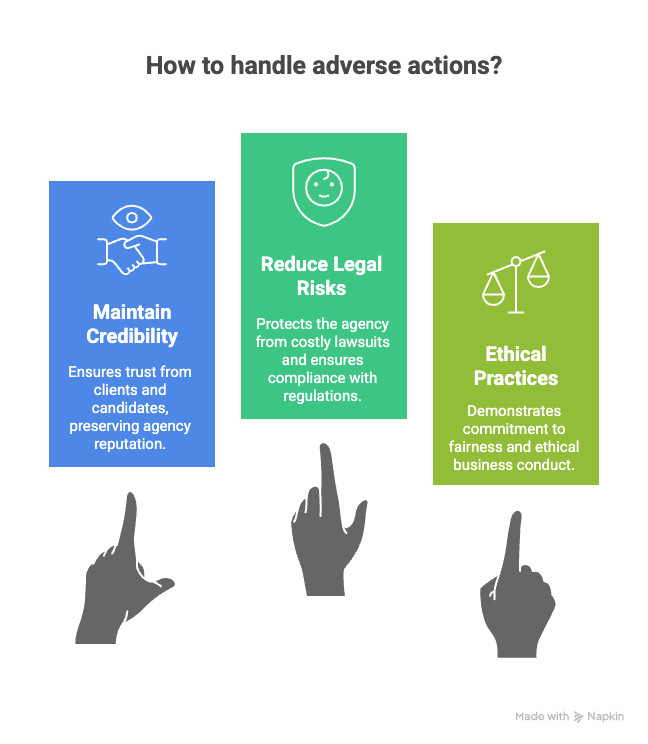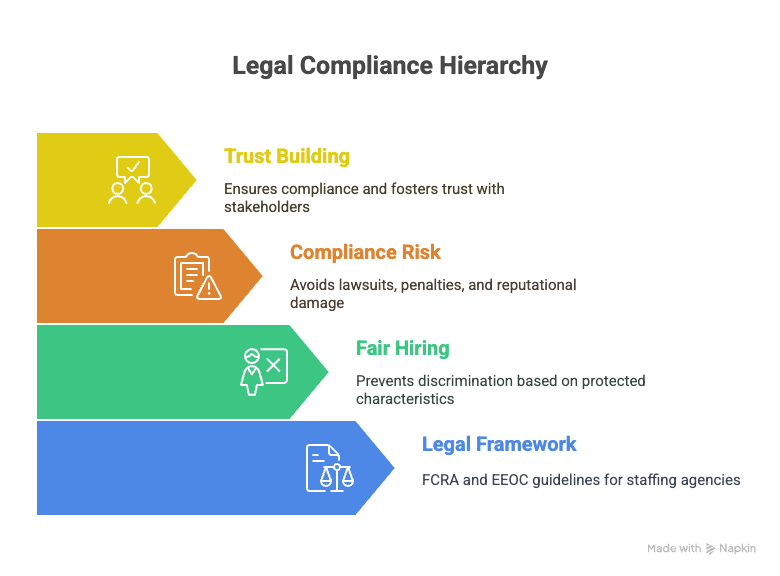In the world of staffing agencies, the ability to make informed hiring decisions is crucial. However, it involves more than just finding the right candidates—it's also about ensuring compliance with laws and regulations, especially when it comes to adverse actions. This guide explores best practices for staffing agencies when navigating adverse actions, from understanding legal obligations to implementing effective procedures and protecting against potential lawsuits.
Key Takeaways
- Adverse action involves making decisions that negatively impact a job candidate, such as rescinding an offer based on background checks.
- Compliance with legal frameworks like the Fair Credit Reporting Act is critical to prevent lawsuits and maintain a solid reputation.
- Following the proper adverse action process, including sending pre-adverse and final notices, ensures fairness and legal protection.
- Consistent training, clear policies, and leveraging technology are essential to streamline adverse action procedures.
- Regular audits, thorough documentation, and legal consultation help avoid discrimination and legal challenges, maintaining trust with clients and candidates.
Introduction
In staffing, adverse action isn't just a legal term—it's a core element of fair hiring. It involves decisions that negatively impact a candidate, like rescinding a job offer based on background checks. This process must be handled precisely. Compliance isn't merely box-ticking; it safeguards your agency against lawsuits and upholds your reputation.
This guide equips you with essential practices. You'll find legal frameworks, steps for implementing adverse action procedures, and ways to maintain compliance. Whether you're a small agency or part of a larger network, following these steps ensures your actions are both effective and lawful.
Understanding Adverse Action
Adverse action refers to any decision by an employer or staffing agency that negatively affects a prospective or current employee's job status. This may include not hiring a candidate, terminating employment, or refraining from promoting an individual based on findings from background checks.
For staffing agencies, handling adverse actions correctly is crucial for several reasons. First, it helps maintain your agency’s credibility. Clients expect you to perform thorough background checks while respecting candidates' rights. Mishandling adverse action can damage your agency's reputation, leading to a loss of trust from both clients and candidates.
It also reduces the risk of legal issues. Adverse actions are subject to strict regulations, like those under the Fair Credit Reporting Act (FCRA). By following protocols, you protect your agency from lawsuits, which can be costly and time-consuming. Furthermore, treating candidates fairly during this process shows your commitment to ethical business practices.

Consider your current procedures: Do they clearly outline how to handle adverse actions? Are your staff trained to manage these situations properly? Approaching these questions can help bolster your compliance efforts.
Legal Framework and Guidelines
Understanding the legal framework surrounding adverse actions is essential for staffing agencies. The Fair Credit Reporting Act (FCRA) is a federal law that plays a crucial role. It mandates that when an agency considers adverse action based on a consumer report, specific procedures must be followed. This includes providing the candidate with a pre-adverse action notice, allowing them the opportunity to dispute or clarify the findings in their report.

The Equal Employment Opportunity Commission (EEOC) offers guidelines to prevent discrimination during hiring. Staffing agencies need to ensure that adverse actions do not unfairly target candidates based on race, gender, or other protected characteristics. It’s crucial to apply these guidelines to foster a fair hiring process and avoid potential claims of discrimination.
Non-compliance with these legal requirements is a significant risk. Agencies may face lawsuits, penalties, and reputational damage if they sidestep these regulations. By adhering to these guidelines, staffing agencies not only ensure compliance but also build trust with candidates and clients alike. Are your agency's practices aligned with these legal standards?
Steps in the Adverse Action Process
When a staffing agency determines that a candidate’s background check disqualifies them from employment, the agency must follow specific steps outlined under the Fair Credit Reporting Act (FCRA). Properly executing each step in the adverse action process can safeguard your agency from legal risks and build trust with candidates.
Pre-Adverse Action Notice:
Begin by providing a pre-adverse action notice to the candidate. This notice serves to inform them that a negative decision might be made based on their background check. It should include a copy of the report and a summary of rights as dictated by the FCRA. This transparency allows candidates to understand the information used against them and potentially dispute inaccuracies. Utilizing a [Pre-Adverse Action Notice Template] can help ensure all necessary legal elements are included.
Waiting Period:
After sending the pre-adverse action notice, observe a waiting period, typically five business days. This time frame allows candidates to review their report and dispute any errors with the consumer reporting agency. Respecting this period not only aligns with legal requirements but also demonstrates fairness, giving candidates an opportunity to respond.
Final Adverse Action Notice:
If, after the waiting period, the decision stands to not move forward with hiring, send a final adverse action notice. This communication must state the decision clearly and inform the candidate of their rights to dispute the report's information or obtain another copy. Including contact details for the consumer reporting agency can assist candidates in resolving any issues, reinforcing the agency’s commitment to a clear and fair process.
Implementing these steps diligently protects your agency from legal challenges and maintains professional integrity with job seekers. Are there procedures you need to refine to ensure compliance and fairness? Consistently reviewing and enhancing your adverse action process can help secure your agency’s reputation and operations.
Best Practices for Implementing Adverse Action Procedures
Establishing clear policies is your first step. Consistency and compliance hinge on well-documented procedures, so make sure your policies are comprehensive and accessible to everyone on your team. Clear guidelines reduce variability in decision-making and safeguard your agency against compliance hiccups.
Training and education can't be overstated, either. Every staff member involved in hiring should be well-versed in adverse action protocols and the relevant legal landscape. Consider regular training sessions as part of your onboarding process and keep everyone updated on changes in the law or best practices. This keeps your team informed and ready to handle any situation with confidence.
Technology plays a crucial role, too. Use software tools to simplify your adverse action procedures. Automation can ease the burden of sending notices and tracking compliance, making your process more efficient. Look for tools that offer integration with your current systems to avoid disruption.
Consistent application of these practices can shield your agency from legal issues and maintain a strong relationship with both clients and candidates. How equipped is your agency to streamline and implement robust adverse action procedures?
Common Challenges and How to Overcome Them
Avoiding Discrimination:
Ensuring fair treatment is a cornerstone of the adverse action process. To avoid discrimination, it's critical to apply criteria consistently across all candidates. Develop a standardized checklist that aligns with Equal Employment Opportunity Commission (EEOC) guidelines. Regular training sessions should focus on unbiased decision-making. This creates a culture of fairness and minimizes unconscious bias.
Effective Communication:
Clear lines of communication foster trust. From the pre-adverse action notice to the final decision, keep candidates informed. Use straightforward language in all correspondence. Encourage feedback to clarify any misunderstandings. Using templates can help maintain clarity and consistency, but they should be reviewed periodically to ensure they remain current and clear.
Navigating Staffing Agency Lawsuits:
Proactively prevent lawsuits by documenting every step of the adverse action process. Maintain detailed records of communications and decisions to establish transparency. In the event of a lawsuit, these records serve as your defense. Consulting with legal professionals familiar with staffing legislation can provide insights into potential areas of vulnerability. Regular policy reviews also help ensure compliance and minimize risk.
Conclusion
Effective management of adverse actions is essential for staffing agencies. It safeguards against legal risks and builds trust with clients and candidates. Compliance with laws, from the Fair Credit Reporting Act to EEOC guidelines, forms the backbone of these processes. Implementing clear policies, investing in staff training, and leveraging technology can streamline operations and enhance accuracy. Regular audits and meticulous documentation further bolster compliance and reduce legal vulnerabilities. By focusing on these strategies, your agency not only mitigates risks but also strengthens its credibility and operational integrity.
Resources
- Explore our blog resources to deepen your understanding of compliance and adverse action processes within the staffing sector.
- For insights on hiring regulations, check out the Department of Labor's guidelines on DOL general hiring practices which provide a comprehensive overview of legal requirements.
Utilizing these resources can enhance your agency's approach to adverse actions, fostering a legally sound and efficient hiring process.
Frequently Asked Questions (FAQs)
What is the adverse action process for staffing agencies?
When a staffing agency considers not hiring a candidate based on information found in a background check, they must follow the adverse action process. This includes providing the candidate with a pre-adverse action notice, a copy of the background report, and a summary of their rights under the Fair Credit Reporting Act (FCRA).
How long should staffing agencies wait after pre-adverse action?
Staffing agencies should wait at least five business days after providing the pre-adverse action notice before taking any final adverse actions, such as rescinding a job offer. This waiting period allows candidates to dispute any inaccuracies in the background report.
Can a staffing agency rescind an offer after a background check?
Yes, a staffing agency can rescind a job offer if information from the background check justifies such a decision. However, they must first follow the FCRA's adverse action process, which includes issuing a pre-adverse action notice, waiting the required period, and then sending an adverse action notice if the decision stands.
What are the penalties for FCRA violations in staffing?
Violations of the FCRA can lead to significant penalties. These can include actual damages incurred by the candidate, attorney fees, and potentially punitive damages for willful violations. Non-compliance can also harm an agency's reputation, leading to loss of trust from clients and candidates.
How to handle candidate disputes during adverse action?
Handle candidate disputes by promptly reviewing any evidence they provide regarding inaccuracies in the background report. Cooperate with the candidate to resolve the issue and communicate any findings clearly. If errors are found, correct them and reassess the candidate's application.
What should a staffing agency include in a pre-adverse action notice?
The pre-adverse action notice should include a copy of the background check report, a summary of the candidate's rights under the FCRA, and a notice indicating the potential for adverse action based on the report.
How can staffing agencies ensure compliance with the FCRA?
Agencies can ensure compliance by regularly training staff on FCRA requirements, maintaining up-to-date knowledge of regulations, and implementing thorough procedures for handling background checks and adverse actions.
What rights do candidates have under the FCRA?
Candidates have the right to be informed if information in their background report was used against them, to receive a copy of the report, and to dispute any incorrect or incomplete information within the report.
How does the FCRA protect candidates during the hiring process?
The FCRA ensures candidates are treated fairly by requiring transparency in the use of background checks and providing them an opportunity to correct any errors before an adverse hiring decision is made.
Definitions
Adverse Action
Adverse action is any employment-related decision that negatively affects a candidate or employee. This includes not hiring someone, revoking a job offer, demoting, or firing based on information like background reports. If your agency relies on a background check to make that decision, federal law requires a structured process to notify the individual and allow time to dispute inaccuracies.
Fair Credit Reporting Act (FCRA)
The Fair Credit Reporting Act is a federal law that regulates how employers use consumer reports, like background checks, in hiring decisions. It requires employers to provide clear notices—such as pre-adverse and final adverse action notices—before making decisions based on these reports. Following FCRA rules helps protect candidate rights and shields your agency from legal challenges.
Equal Employment Opportunity Commission (EEOC)
The EEOC enforces federal laws that make it illegal to discriminate against job applicants or employees. It provides guidance to ensure your hiring and adverse action decisions don’t unfairly target people based on race, sex, age, disability, or other protected traits. Is your team trained to apply screening rules consistently across all candidates?
Pre-Adverse Action Notice
This notice is the first step when you plan to take negative action based on someone’s background check. It must include a copy of the report and a summary of consumer rights. The goal is transparency—giving the candidate time (usually five business days) to respond or correct errors before any final decision is made.
Compliance
Compliance means following laws and internal policies when making hiring decisions. In adverse actions, it involves sending the right notices, observing waiting periods, keeping thorough records, and applying rules fairly. Is your agency consistently checking that procedures match legal standards? Regular audits can help catch gaps early.
References
- National Association of Personnel Services (NAPS) “FCRA Compliance Staffing Industry” whitepaper: https://cdn.ymaws.com/www.naps360.org/resource/resmgr/Files/FCRA-compliance-staffing.pdf
- Fisher Phillips “4-Step FCRA Compliance Plan for Handling Pre-Adverse Action”: https://www.fisherphillips.com/en/news-insights/4-step-fcra-compliance-plan.html
Still have questions?
Get in touch with our team today for a personalized demo and discover how our tailored volume pricing and packages can drive results for your business!
How useful was this page?*
Note: your comments are anonymous. We use them to improve the website. Do not include any personal details.
Visit our FCRA Compliance Tool or leave a message here if you need a response.
From the blog Explore the GCheck Content Hub

Navigating the New York Education Background Check Process: A 2026 Operational Guide
28 Jan, 2026 • 18 min read
Florida Education Background Checks: 2026 Compliance Guide for School Districts
27 Jan, 2026 • 19 min read
Texas Construction Background Check Requirements: Compliance and Best Practices for 2026
27 Jan, 2026 • 19 min readThe information provided in this article is for general informational and educational purposes only and should not be construed as legal advice or a substitute for consultation with qualified legal counsel. While we strive to ensure accuracy, employment screening laws and regulations—including but not limited to the Fair Credit Reporting Act (FCRA), Equal Employment Opportunity Commission (EEOC) guidelines, state and local ban-the-box laws, industry-specific requirements, and other applicable federal, state, and local statutes—are subject to frequent changes, varying interpretations, and jurisdiction-specific applications that may affect their implementation in your organization. Employers and screening decision-makers are solely responsible for ensuring their background check policies, procedures, and practices comply with all applicable laws and regulations relevant to their specific industry, location, and circumstances. We strongly recommend consulting with qualified employment law attorneys and compliance professionals before making hiring, tenant screening, or other decisions based on background check information.

